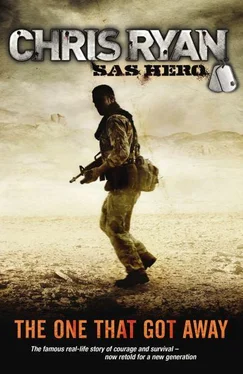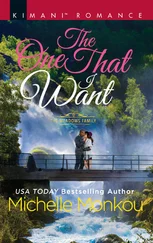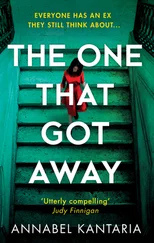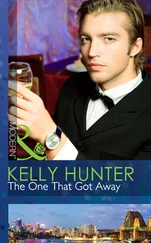At last I got my head down. But still I was tossing and turning, my mind full of disturbing images — of my comrades wandering in the desert, or worse still being killed.
In the end, though, I fell asleep — only to be dragged back by the phone ringing just after 3 a.m. It was the defence attaché on the line, speaking in hushed whispers.
‘What happened to the Charlie Oscar Delta Echo Sierra?’ he breathed.
‘What?’
He repeated himself.
‘What are you on about?’
‘What happened to the codes ?’
Suddenly I realized that he was trying to be covert, spelling out ‘codes’ like that. Also I realized that it must be High Wycombe who were asking for the information. Whenever we encrypt a message, we put it into code, then burn the cipher and smash the encryption device. In fact, Legs had carried our cipher equipment. He had burned the codes and smashed the device when we were first compromised.
‘One of the other lads had them,’ I said. ‘He burned them. I never had them at all.’
‘OK,’ he said, and rang off.
That was when I knew for sure that nobody else had come out.
In the morning I ordered breakfast from room service, and ate some fruit salad and a roll. I still didn’t want anything substantial, but I drank pints of fruit juice and tea. Compared with the day before, I felt quite good. Then the Brits came to collect me, and I hobbled back to the embassy, shuffling along the pavement in my stockinged feet, with my shoes under my arm.
By the time we arrived, the place was full of people. The chargé d’affaires had appeared, and there were two British girls on duty, one dealing with communications, the other a typist. I chatted to them for a while, then they put me up against a wall in my shirt and tie to take a black-and-white passport photograph with a Polaroid camera. ‘Better be careful,’ somebody said. ‘We’ve only got two frames left.’ But the first shot came out well, so they trimmed it, stuck it into a blank passport and stamped it. There I was, fixed up with a ten-year passport. The whole thing seemed so amateurish that I felt I was being given a Second World War escape kit.
During the morning some questions came back from High Wycombe. I mentioned that I’d walked through some installation which looked like a signals complex.
‘No,’ the second secretary said. ‘That’s not a signals complex. That’s the yellowcake processing facility at Al Qaim.’ He knew everything about the place — even the number of the Iraqi regiment guarding it. The latticework towers I’d seen on the high ground were for defence, not communication: the cables slung between them were in fact chains, to prevent attacks from low-flying aircraft.
‘What’s going on there?’ I asked.
‘We don’t know exactly. Some sort of nuclear processing.’
‘ What? I drank some water coming out of that place, and it tasted terrible.’
‘Effluent,’ he said. ‘Nuclear effluent.’
I felt my insides go cold. Had I swallowed some radioactive waste and contaminated myself, maybe with fatal consequences?
Later we headed down to the airport to buy a ticket and get me on the flight to London. I got as far as the check-in desk, but there the guy stopped me because I didn’t have a stamped visa showing when I’d entered the country. I couldn’t argue with him, and I ended up back at the embassy. It looked like I’d have to stay in Syria for a couple of days.
I went off with the defence attaché to see about a visa. We visited a building which was full of tiny offices. We were passed from pillar to post. All in all we saw about twenty people. ‘Well,’ the final official said, ‘if you haven’t got an entry visa, you can’t leave.’
So we’d wasted the whole morning. I said to the DA, ‘Why not phone my friend in the police again?’
‘Oh no,’ he said, ‘we can’t do that.’
So I waited till I was away from him, and asked the second secretary the same question. He put through a call, and very soon a message was on its way from the police to the visa building. When we next went down, I collected my exit visa without difficulty.
The next flight out was in two days’ time — but now things had changed. Instead of returning to the UK, I was told I’d be flying to Cyprus, where I’d be put onto a Hercules that was coming across from Riyadh, the capital of Saudi Arabia. From Cyprus I was to fly to the Saudi capital, spend one night there, and then return to the squadron at Al Jouf. That suited me much better. All I wanted was to get back to the squadron, so that I could find out about the rest of the patrol, and brief any other guys who might be going in.
That evening, back in the hotel, I had a meal in my room and went to bed. But still I couldn’t relax: the missing guys were too much on my mind. It felt really bad to be sitting in Damascus, unable to contribute any information which might help with their recovery.
Back in the embassy next day, I was chatting to the two girls. One of them suggested I’d be more comfortable chilling out in her flat. As we sat there talking, I said, ‘D’you mind if I take off my shoes and socks, and have another look at my feet?’
By then the cuts had dried up a good bit, but they still weren’t a pretty sight, and when I stripped the dressings off, they were horrified. Until then, I don’t think either of the girls quite realized what I’d been through. They imagined I’d just been for a bit of a walk. Anyway, they were full of sympathy — and it was good just to sit there and let my feet breathe.
My fingers were nearly as bad as my feet. I still had no feeling in the tips, and when I squeezed my nails, pus kept oozing out. So I asked if she’d got a scrubbing brush, and went to the basin and scrubbed my fingers really hard. It was total agony, but I got the dirt out from under the nails, and all the pus, until blood was running freely. Then I rinsed my hands off. I hoped they would now begin to heal. Obviously I should have seen a doctor, but the embassy had no medic in residence, and a message from High Wycombe had told me not to make contact with anyone outside.
The embassy people did their best to entertain me. The DA’s assistant, a sergeant, took me out for a drive round the heights of Damascus and showed me some of the military installations. We chatted about my escape. ‘You’re going to get a medal for this,’ he said.
‘Why?’ I asked. ‘It was nothing special.’
Until that moment it hadn’t occurred to me that I’d done anything exceptional. I’d just been for rather a long walk. The job we’d been tasked to do had proved rather more difficult than expected — but I’d had to go through with it all the same.
When the time came to leave, my weapon and ammunition obviously had to stay behind, but I wanted to take the TACBE and the night-sight, because I knew that those things were in short supply back at the squadron. But the second secretary made me leave them, in case they aroused suspicion and got me pulled in for questioning at the airport.
When I went to board the Syrian Airlines aircraft I kept my bag with me, but as I reached the top of the steps, the steward said something aggressive to me in Arabic and threw it back down to the ground. As I went in through the door, I could only hope that someone would put it on board. On the plane, my seat was right at the back. As soon as we were airborne, with the no-smoking lights still on, everyone lit cigarettes. I’ve never been on an aircraft so full of smoke; you couldn’t see from one end of the cabin to the other.
I didn’t care about any of that. I was just relieved to be leaving Syria. Even in the hands of the embassy people, I’d never felt entirely safe. Damascus had a dangerous air about it, and memories of the mock-execution out in the desert kept me on edge.
Читать дальше












